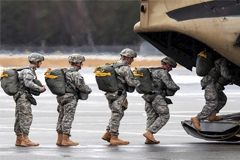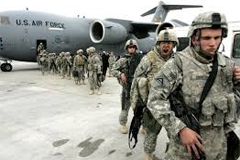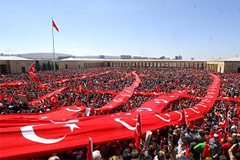News + Media
 |
AuditAugust 1, 2007Pax mercatoria: does economic interdependence bring peace?PR GoldstoneDo high levels of international trade lead to peace? Norman Angell authored the best-selling book on international politics in history, arguing that economic interdependence between Germany and England made any war between the two unthinkable—an illusion. |
 |
In the NewsJuly 26, 2007Rights and security: a broad viewJohn TirmanWashington, D.C. |
 |
Analysis + OpinionJuly 18, 2007More troops for what?Benjamin FriedmanForeign PolicyHoping to sound tough on terror, U.S politicians and pundits of all political stripes are calling for a massive expansion of the U.S. military. But adding more troops has nothing to do with fighting terrorism, and would merely serve the same failed strategy that gave us Iraq. |
 |
News ReleaseJuly 3, 2007Australian journalist named Neuffer Fellow, joins CISSally Sara, anchor and senior reporter for the Australian Broadcasting Corporation (ABC), has received the Elizabeth Neuffer Fellowship. Sara is the third recipient of the annual fellowship, which gives a woman journalist working in print, broadcast, or online media the opportunity to focus exclusively on human rights journalism. |
 |
In the NewsJuly 1, 2007Book Review Roundtable: Kenneth B. Pyle's Japan Rising and Richard J. Samuels' Securing JapanT.J. Pempel, Mike M. Mochizuki, Ming Wan, Christopher W. Hughes, Richard J. Samuels, and Kenneth B. PyleAsia PolicyThe authors of these excellent books on Japanese grand strategy traverse beyond their home disciplines. The historian Kenneth B. Pyle explains shifts in Japan by applying a political science theory that argues that the international system shapes a country's domestic institutions as well as its external behavior. The political scientist Richard J. Samuels places the current Japanese debates about strategy in a broad historical context to "connect the ideological dots" of national discourse over nearly 150 years of history. Both books seek to assess the degree and nature of change in Japanese strategy, to explain this change, and to suggest where Japan might be headed. Although there is much about which Pyle and Samuels agree, there are also some significant differences. |
 |
AuditJuly 1, 2007Fewer missions, not more troopsBenjamin H Friedman, MITA bipartisan consensus wants to expand the American ground forces. But the expansion serves a failed strategy that relies on military occupations and state-building to fight terrorism. A better strategy is to avoid these missions and the troop expansion. |
 |
Analysis + OpinionMay 28, 2007'24' on the brainKelly M. GreenhillLos Angeles TimesTorture is a staple on the popular show. Are Americans able to separate fact from fiction? |
 |
News ReleaseMay 14, 2007New book details key changes in the staffing of western militariesDramatic changes are underway for the men and women of the armed forces of North America and Europe, according to a new book,Service to Country: Personnel Policy and the Transformation of Western Militaries. |
 |
AuditMay 1, 2007Paying for homeland security: show me the moneyCindy Williams, MITIn January 2003, the Bush administration drew 22 disparate agencies and some 170,000 employees into a new Department of Homeland Security (DHS). Proponents of the reorganization hoped a single department under a single cabinet secretary would foster unity of effort across a substantial portion of the federal activities related to domestic security. |
 |
AuditMay 1, 2007Turkey: misperceptions and the healing touch of democracyDogu Ergil, Ankara UniversityMass demonstrations in late April brought out hundreds of thousands of people in Ankara and perhaps a million people one week later in Istanbul, an awesome scene on both occasions. Demonstrations of lesser scale are underway in smaller cities like Canakkale and Manisa—a trend to continue until early elections scheduled for July 22. |

